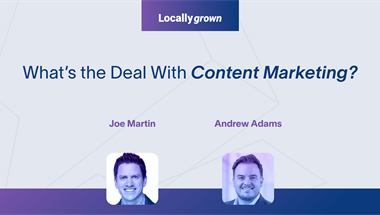“Life moves pretty fast. If you don’t stop and look around once in a while, you could miss it.”
- Ferris Bueller, Ferris Bueller’s Day Off (1986).
As it turns out, the Internet also moves pretty fast. Recently, I tripped into one of those “stop and look around” moments as I was cleaning out old notes. I came across a screenshot I saved in January 2015, and my jaw nearly hit the floor.
In case it isn’t obvious, this is a screenshot of a Google SERP (Search Engine Results Page) for “plumber Dallas, TX”.
Before scrolling down the page, there were 14 business results to choose from. The results included:
- 8 Pay-Per-Click Ads (see the green boxes)
- 3 Organic Results (see the blue boxes)
- 3 Local Results (see the orange box)
I did the same search on my computer today. Here’s the result:
Before scrolling down the page, there are a mere five results to choose from. They are:
- 3 Local Services Ads
- 2 Pay-Per-Click Ads
I was shocked by how much has changed in five years.
- The number of search results above the fold (before you scroll down the page) has decreased by 180% (from 14 in 2015 to 5 in 2020).
- The types of results are completely different. Local Services Ads (LSAs), which dominate the top of the results today, did not exist in 2015. In 2015, there were 6 organic results at the top of the page, 3 local (map), and 3 traditional. Today, there are 0 organic results.
- Google showed there were 359,000 total results for my search in 2015. Today, Google found over 27,300,000 results that matched my search for “plumber Dallas, TX”.
- BBB (Better Business Bureau) held the #1 organic result in 2015. Today, I can’t find it on the first 3 pages. Instead, you’ll find a combination of local plumbers among popular national web-based directories and review sites like Yelp, Angi, Home Advisor, and Thumbtack.
What’s the impact of these changes on local, service-based businesses (i.e. home services businesses, attorneys, medical practices, etc.) that rely heavily on Google to acquire new customers? I’ll share a few thoughts to consider.
First, it’s obvious that visibility at the top of Google results has gotten much more competitive. The number of consumers who use Google to find and research businesses has gone up (demand), and the number of results at the top of the page has gone down (supply). Obviously, when demand is up and supply is down, competitiveness (price) increases.
What can businesses who rely on Google for new leads and customers do about this? On one hand, not much as it relates to how Google shows results and how much Google charges to advertise. On the other hand, businesses do have options.
While Bing doesn’t have as large of an audience as Google, it is much less competitive and often much less expensive to advertise. The same could be said for Yahoo and other popular Search directories that consumers trust, including Yelp.
Another option is that businesses get more serious about investing in their brand, and brand-awareness advertising. Those advertising options could include thousands of websites, but some of the more popular would be social sites and apps like Facebook and Instagram, pure-play video platforms like YouTube, email providers like Gmail, and popular news sites.
But your brand means much more than advertising in more places. Your brand communicates your values, what makes you unique, and how you make customers and potential customers feel when they experience your website and other content that exists about you online. That content includes what others say about your business on third-party review sites like Google My Business, Facebook, and Yelp.
Your immediate reaction to my comments on brand probably aligns with one of the following thoughts:
- “Interesting...people do need to know more about my brand…"
- “Investing in my brand is stupid because I can’t immediately tie that back to a cost per lead…"
- “I’m a (plumber, pest control company, HVAC, attorney, dentist). People don’t care about my brand…"
- “What exactly does brand mean to my business?"
Despite what your thoughts on brand may be, here’s the reality. The more people who think positively about your business first when they need a service (or product) you provide, the more likely they are to choose you over alternatives. The only way they will think positively about your business first is if they:
- Know who you are (hello marketing and advertising); and
- Like how you’ve made them feel through content, creative assets (i.e. your website and ads), and/or proof of others’ experiences with your business (hello branding).
I’ll leave you with this. Life (and the Internet) moves pretty fast. When I stop to clean out my notes in 2025, I wonder how different 2020’s Google search results will look. Keep in mind that in 2015, mobile internet usage was less than 35% compared to desktop. In 2020, mobile usage exceeds that of desktop, and continues to accelerate. Five years from now, it’s likely that voice will play a much larger role in the marketing landscape. If that’s the case, how will your business stand out in a world of, “Hey Google (or Alexa), call a plumber”? You should know that you do have options. One of those options is to create a scenario where, instead, people say “Hey Google, call [your business name]”. If that’s what you want, choose to get to work on your brand now.
You’ll have a massive advantage when you do.


.2202071054276.jpg)

